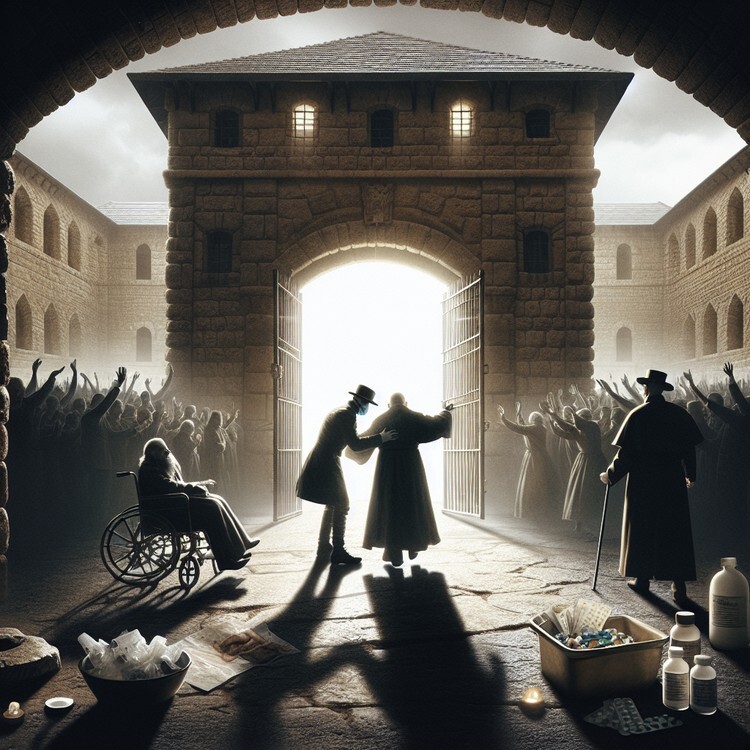Someone made fake phone calls pretending to be President Biden. They told people not to vote in a special voting day called the primary in New Hampshire. The calls were not real, and people are trying to find out who made them. The fake calls said that the President wanted people to wait and vote later in the year. But people can vote on both days.
The people who work for the law in New Hampshire said the calls were bad and against the rules. They told everyone to ignore the fake calls. The calls were made to look like they came from a woman’s phone who likes President Biden. There were many, many calls made. The President’s team said the calls were very wrong because they tried to stop people from voting.
Original news source: Fake Biden robocall tells voters to skip New Hampshire primary election (BBC)
🎧 Listen:
Slow
Normal
Fast
📖 Vocabulary:
| 1 | pretending | Playing make-believe or acting like you are someone else |
| 2 | vote | To choose who you want to be the leader by marking a paper or pressing a button |
| 3 | primary | The first test to see who might become the leader |
| 4 | fake | Something that is not real or true |
| 5 | discover | To find something you were looking for |
| 6 | ignore | To not listen to someone or something |
| 7 | law | The rules that tell people what they can or cannot do |
| 8 | against | When you are not following the rules |
| 9 | team | A group of people who work together |
| 10 | stop | To make something not move or go anymore |
Group or Classroom Activities
Warm-up Activities:
– News Summary
Instructions: Read the article out loud to the class. Then, ask the students to work in pairs or small groups to summarize the main points of the article in their own words. After a few minutes, have each group share their summaries with the class.
– Vocabulary Pictionary
Instructions: Write down key vocabulary words from the article on separate pieces of paper and put them in a hat or bowl. Divide the class into teams. One player from each team will take turns picking a word from the hat and drawing it on the board, while their team members try to guess the word. The team that guesses the most words correctly wins.
– Keyword Hangman
Instructions: Choose a few important keywords from the article and write them on the board with dashes representing the letters. Have the class take turns guessing letters to try and fill in the blanks. If a guess is correct, write the letter in the appropriate place. If a guess is incorrect, start drawing a hangman. The class must try to guess the keyword before the hangman is completed.
– Pros and Cons
Instructions: Divide the class into two groups. Assign one group to come up with the pros (positive aspects) of the fake phone calls, and the other group to come up with the cons (negative aspects). Give the groups a few minutes to brainstorm and then have them share their ideas with the class. Encourage a respectful discussion and allow students to express their opinions.
– Two Truths and a Lie
Instructions: Have each student come up with two true statements and one false statement related to the article. In pairs or small groups, students take turns sharing their statements and the others have to guess which one is the lie. This activity encourages listening skills and critical thinking.
🤔 Comprehension Questions:
1. What did someone do with the phone calls?
2. What did the fake calls say about voting?
3. What did the people who work for the law say about the calls?
4. Who did the calls pretend to come from?
5. Were there a lot of calls made?
6. What did the President’s team say about the calls?
7. Can people vote on both voting days?
Go to answers ⇩
🎧✍️ Listen and Fill in the Gaps:
Someone (1)______ fake phone (2)______ pretending to be President Biden. They told people not to vote in a special voting day called the primary in New Hampshire. The calls were not real, and (3)______ are trying to find out who made them. The fake calls said that the (4)______ wanted people to wait and vote later in the year. But people can vote on both days.
The people who work for the law in New Hampshire (5)______ the calls were bad and against the rules. They (6)______ everyone to ignore the fake calls. The calls were made to look like they came from a woman’s (7)______ who likes President Biden. There were many, many calls made. The President’s (8)______ said the calls were very wrong because they tried to stop people from voting.
Go to answers ⇩
💬 Discussion Questions:
Students can ask a partner these questions, or discuss them as a group.
1. What is a fake phone call?
2. How would you feel if someone made a fake phone call pretending to be you?
3. Do you think it’s important to vote in elections? Why or why not?
4. What is a special voting day called the primary?
5. How would you feel if someone told you not to vote on a special voting day?
6. Do you like President Biden? Why or why not?
7. What do you think the President’s team means when they say the calls were very wrong?
8. Have you ever received a phone call that you thought was fake? What did you do?
9. What do you think the people who work for the law in New Hampshire should do to find out who made the fake calls?
10. How would you feel if you received a fake call from someone pretending to be your favorite celebrity?
11. Do you think it’s important to ignore fake calls? Why or why not?
12. What do you think should happen to the person who made the fake calls?
Individual Activities
📖💭 Vocabulary Meanings:
Match each word to its meaning.
Words:
1. pretending
2. vote
3. primary
4. fake
5. discover
6. ignore
7. law
8. against
9. team
10. stop
Meanings:
(A) The first test to see who might become the leader
(B) When you are not following the rules
(C) The rules that tell people what they can or cannot do
(D) To make something not move or go anymore
(E) Something that is not real or true
(F) To choose who you want to be the leader by marking a paper or pressing a button
(G) To find something you were looking for
(H) Playing make-believe or acting like you are someone else
(I) A group of people who work together
(J) To not listen to someone or something
Go to answers ⇩
🔡 Multiple Choice Questions:
1. What did someone pretend to be in the fake phone calls?
(a) Santa Claus
(b) Spider-Man
(c) President Biden
(d) A dinosaur
2. Where did the fake phone calls tell people not to vote?
(a) California
(b) Texas
(c) Florida
(d) New Hampshire
3. What did the fake calls say about voting later in the year?
(a) The President wanted people to wait and vote later.
(b) The President wanted people to vote now.
(c) The President wanted people to vote in a different state.
(d) The President didn’t want people to vote at all.
4. How did the fake calls make it seem like they came from a woman’s phone?
(a) They used a man’s phone number.
(b) They didn’t use a phone number.
(c) They used a woman’s phone number.
(d) They used a computer instead of a phone.
5. What did the people who work for the law say about the fake calls?
(a) They were good and followed the rules.
(b) They were funny and entertaining.
(c) They were scary and made people cry.
(d) They were bad and against the rules.
6. What did the President’s team say about the fake calls?
(a) They were very right because they helped people vote.
(b) They were very wrong because they tried to stop people from voting.
(c) They were very silly because they made people laugh.
(d) They were very boring because they didn’t say anything interesting.
7. When can people vote in New Hampshire?
(a) On both the special voting day and the primary day.
(b) Only on the special voting day.
(c) Only on the primary day.
(d) Never, voting is not allowed in New Hampshire.
8. How many fake calls were made?
(a) Only one call was made.
(b) Many, many calls were made.
(c) No calls were made.
(d) The article doesn’t say how many calls were made.
Go to answers ⇩
🕵️ True or False Questions:
1. The calls were made to look like they came from a man’s phone.
2. Someone pretended to be President Biden and made authentic phone calls.
3. The fake calls tried to stop people from voting.
4. The calls were not real and people are trying to find out who made them.
5. The President’s team said the calls were absolutely right.
6. The law in New Hampshire said the calls were good and within the rules.
7. The fake calls told people not to vote in New Hampshire.
8. People can vote on both the special voting day and later in the year.
Go to answers ⇩
📝 Write a Summary:
Write a summary of this news article in two sentences.
Check your writing now with the best free AI for English writing!
Writing Questions:
Answer the following questions. Write as much as you can for each answer.
Check your answers with our free English writing assistant!
1. What did someone pretend to be in the fake phone calls?
2. What did the fake calls tell people not to do?
3. Were the calls real or fake?
4. What did the people who work for the law say about the calls?
5. Why did the President’s team say the calls were wrong?
✅ Answers
🤔✅ Comprehension Question Answers:
1. What did someone do with the phone calls?
They made fake phone calls.
2. What did the fake calls say about voting?
They said not to vote in the special voting day called the primary in New Hampshire.
3. What did the people who work for the law say about the calls?
They said the calls were bad and against the rules.
4. Who did the calls pretend to come from?
They pretended to come from a woman’s phone who likes President Biden.
5. Were there a lot of calls made?
Yes, there were many, many calls made.
6. What did the President’s team say about the calls?
They said the calls were very wrong because they tried to stop people from voting.
7. Can people vote on both voting days?
Yes, people can vote on both voting days.
Go back to questions ⇧
🎧✍️✅ Listen and Fill in the Gaps Answers:
(1) made
(2) calls
(3) people
(4) President
(5) said
(6) told
(7) phone
(8) team
Go back to questions ⇧
📖💭✅ Vocabulary Meanings Answers:
1. pretending
Answer: (H) Playing make-believe or acting like you are someone else
2. vote
Answer: (F) To choose who you want to be the leader by marking a paper or pressing a button
3. primary
Answer: (A) The first test to see who might become the leader
4. fake
Answer: (E) Something that is not real or true
5. discover
Answer: (G) To find something you were looking for
6. ignore
Answer: (J) To not listen to someone or something
7. law
Answer: (C) The rules that tell people what they can or cannot do
8. against
Answer: (B) When you are not following the rules
9. team
Answer: (I) A group of people who work together
10. stop
Answer: (D) To make something not move or go anymore
Go back to questions ⇧
🔡✅ Multiple Choice Answers:
1. What did someone pretend to be in the fake phone calls?
Answer: (c) President Biden
2. Where did the fake phone calls tell people not to vote?
Answer: (d) New Hampshire
3. What did the fake calls say about voting later in the year?
Answer: (a) The President wanted people to wait and vote later.
4. How did the fake calls make it seem like they came from a woman’s phone?
Answer: (c) They used a woman’s phone number.
5. What did the people who work for the law say about the fake calls?
Answer: (d) They were bad and against the rules.
6. What did the President’s team say about the fake calls?
Answer: (b) They were very wrong because they tried to stop people from voting.
7. When can people vote in New Hampshire?
Answer: (a) On both the special voting day and the primary day.
8. How many fake calls were made?
Answer: (b) Many, many calls were made.
Go back to questions ⇧
🕵️✅ True or False Answers:
1. The calls were made to look like they came from a man’s phone. (Answer: False)
2. Someone pretended to be President Biden and made authentic phone calls. (Answer: False)
3. The fake calls tried to stop people from voting. (Answer: True)
4. The calls were not real and people are trying to find out who made them. (Answer: True)
5. The President’s team said the calls were absolutely right. (Answer: False)
6. The law in New Hampshire said the calls were good and within the rules. (Answer: False)
7. The fake calls told people not to vote in New Hampshire. (Answer: True)
8. People can vote on both the special voting day and later in the year. (Answer: True)
Go back to questions ⇧














